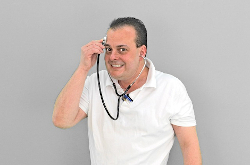배와 뇌는 연결되어 있다

A new study provides more evidence that there is a deep connection between our gut and our brains.
The findings suggest that probiotics -- so-called "good" bacteria that aid in digestion -- may also help to lessen symptoms of depression.
There are about 300 to 500 bacterial species that live in the human gut. Many help with digestion and keep the gastrointestinal system working right.
Scientists say these probiotics play a part in neural activity that controls digestion. In addition, there is also new evidence that shows probiotics can also affect a person's mental state, or mood.
Premysl Bercik is a researcher at Ontario Canada's McMaster University. Bercik is interested in the connection between the gut and the brain through the millions of bacteria that live in the gastrointestinal tract.
Bercik notes that between 40 and 90 percent of people with irritable bowel syndrome, or IBS, also suffer from symptoms of anxiety and depression.
Doctors do not yet know what causes IBS. It causes stomach pains and can interfere with the body’s waste removal process. The difficulty and discomfort of the condition alone might cause depression.
However, research led by Bercik suggests that the presence or lack of gut bacteria may affect a person’s mood.
"What we found was that the patients who were treated with this probiotic bacterium improved their gut's symptoms, but also surprisingly decreased their depression scores. That means their mood improved. And this was associated also with changes in the brain imaging."
What Bercik describes is a small, early study of 44 IBS patients who also had anxiety or depression.
Half of the patients received a daily probiotic. The other half received an inactive substance called a placebo. The patients were then followed for 10 weeks.
At the start of the study, the researchers scored the levels of depression and anxiety in the patients. Then the patients looked at a mix of happy and sad images. At the same time, imaging devices recorded the brain reactions to those images. It showed the researchers what parts of the brain were active in connection with the images.
At six weeks, 64 percent of patients taking the probiotic had a decrease in their depression scores. The depression scores also dropped in 32 percent of the patients taking placebos.
A second imaging study showed changes in multiple brain areas involved in mood control, in the patients who felt better.
Bercik says larger studies are needed to confirm the findings.
"However, I think that it shows a great promise. I mean new treatments, not only for patients with functional bowel disorders like irritable bowel syndrome, but also it may offer some new treatments for patients with primary psychiatric disorders like major depression or anxiety."
The researchers published their findings in the journal Gastroenterology.

